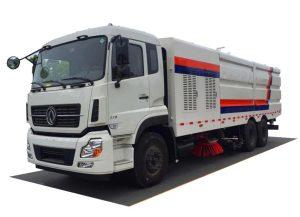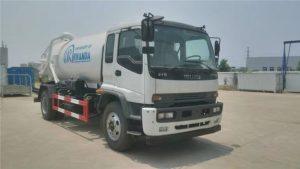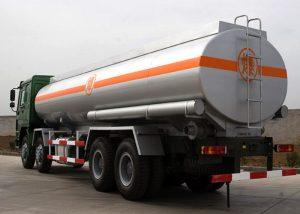Monday to Saturday - 8:00 -17:30
Mobile Gas Truck: The Future of Fuel Delivery
The mobile gas truck is revolutionizing the way we think about fuel delivery. With advancements in technology and logistics, mobile gas trucks provide a convenient and efficient solution for businesses and individuals who require fuel on the go. This article will explore the various aspects of mobile gas trucks, including their design, benefits, practical applications, and much more.
What is a Mobile Gas Truck?
A mobile gas truck, also known as a fuel delivery truck, is a vehicle specifically designed to transport and deliver gasoline and other types of fuel. These trucks are equipped with specialized storage tanks, pumps, and hoses to facilitate safe and efficient fuel delivery to a variety of locations, including construction sites, farms, and emergency services.
Key Features of Mobile Gas Trucks
- Storage Capacity: Mobile gas trucks come in various sizes, with storage capacities ranging from a few hundred to several thousand gallons, catering to different customer needs.
- Dispensing Equipment: Equipped with pumps and hoses, mobile gas trucks allow for easy dispensing of fuel into equipment, vehicles, or storage tanks.
- Safety Measures: Mobile gas trucks are designed with safety features such as spill prevention systems, fire extinguishers, and proper signage to ensure compliance with regulations.
- GPS Tracking: Many mobile gas trucks are equipped with GPS for efficient route planning and real-time tracking of deliveries.
Why Choose Mobile Gas Truck Services?
Mobile gas trucks offer a range of benefits that make them an attractive option for fuel delivery. Below are some key reasons to consider this service:
Convenience
Mobile gas trucks provide fuel delivery directly to your location, eliminating the need to travel to a gas station. This is especially beneficial for businesses that rely on heavy machinery or vehicles that require constant fueling.
Time-Saving
By utilizing a mobile gas truck service, businesses can save significant time. Employees can focus on their work rather than spending time refueling at external stations.
Cost-Effectiveness
Mobile gas trucks can reduce costs associated with fuel purchases. Many services offer competitive pricing, bulk discounts, and even loyalty programs for regular customers.
Advantages for Different Industries
Construction
In the construction industry, mobile gas trucks provide timely fuel delivery to construction sites, minimizing downtime for heavy machinery.
Agriculture
Farmers can benefit from mobile gas delivery by ensuring their equipment stays operational throughout planting and harvesting seasons without the hassle of regular refueling trips.
Emergency Services
Emergency responders can rely on mobile gas trucks to deliver fuel quickly, ensuring that their vehicles remain operational during critical times.
How Mobile Gas Trucks Work
The operation of mobile gas trucks is straightforward and efficient. Here’s how the process typically works:
1. Scheduling a Delivery
Customers can schedule a fuel delivery through phone calls, websites, or mobile applications. Most services allow for flexible scheduling options, including same-day delivery.
2. Route Planning
Upon scheduling, a route is planned using GPS technology. This optimizes delivery time and minimizes fuel consumption by selecting the most efficient route.
3. Delivery Process
The mobile gas truck arrives at the specified location with the required amount of fuel. The driver connects the dispensing equipment to the customer’s machinery or storage tank, ensuring proper safety protocols are followed.
4. Payment and Documentation
After the fuel delivery is complete, customers receive invoices and documentation for their records, facilitating accountability and tracking for business expenses.
Mobile Gas Truck Regulations and Safety Standards
Fuel delivery is heavily regulated due to its hazardous nature. Below are some important regulations to keep in mind regarding mobile gas trucks:
Environmental Regulations
Mobile gas trucks must comply with environmental regulations that prevent fuel spills and leaks. This includes having proper containment measures in place and ensuring that all operations meet local environmental standards.
Safety Training
Drivers of mobile gas trucks must undergo safety training to handle fuel properly, including hazardous materials handling and emergency response training.
Licensing and Permits
Operators must possess the necessary licenses and permits to deliver fuel legally, which can vary by state and region. This often includes certifications for transporting hazardous materials.
Choosing the Right Mobile Gas Truck Service
When selecting a mobile gas truck service, consider the following factors:
1. Reputation and Experience
Research reviews and testimonials to ensure you’re choosing a service with a good reputation and experience in the industry.
2. Service Offerings
Check if the company provides flexible options like on-demand deliveries, bulk purchase discounts, and loyalty programs.
3. Safety Compliance
Ensure that the service adheres to safety regulations and has insurance coverage to protect against potential mishaps.
4. Customer Support
Look for providers with excellent customer service that can assist with deliveries, invoices, and any inquiries you may have.
The Future of Mobile Gas Truck Technology
As technology advances, mobile gas trucks are becoming more efficient and user-friendly. Here are some potential future trends:
Eco-Friendly Fuels
The shift towards more sustainable and eco-friendly fuel options could lead to mobile gas trucks offering alternative fuels such as biodiesel or electric charging units.
Automation and Drones
Future innovations may include automated driving technology and drones for fuel delivery, which could enhance efficiency and reduce human error.
Enhanced Tracking Systems
The integration of AI and machine learning can improve route optimization and tracking systems, further enhancing delivery times and customer satisfaction.
Cost Considerations for Mobile Gas Truck Services
Understanding the costs associated with mobile gas truck services is essential for budgeting. Below are some factors to consider:
Fuel Prices
The cost of fuel fluctuates due to market conditions. Mobile gas truck services typically charge based on current fuel prices plus a delivery fee.
Delivery Charges
Delivery fees vary by distance and are often tiered based on the volume of fuel being delivered. Some companies offer free delivery within a certain radius.
Membership or Loyalty Programs
Many mobile gas truck services also provide membership or loyalty programs that can save frequent users money on fuel costs and delivery charges.
Frequently Asked Questions (FAQs)
1. What types of fuel can be delivered by mobile gas trucks?
Mobile gas trucks can deliver a variety of fuels, including gasoline, diesel, biodiesel, and in some cases, heating oil.
2. Are mobile gas truck services available 24/7?
Many mobile gas truck services operate around the clock, but availability may vary by company and location. It’s best to contact the service provider directly.
3. How do I ensure the safety of fuel deliveries?
Choose a service that adheres to safety regulations, provides well-trained drivers, and uses proper safety equipment during deliveries.
4. Can I schedule recurring fuel deliveries?
Yes, many mobile gas truck services offer the option for recurring deliveries on a schedule that suits your needs, ensuring you never run out of fuel.
5. How are fuel prices determined for deliveries?
Fuel prices are typically based on current market rates, and companies may add a delivery fee. It’s best to ask for a detailed quote before scheduling a delivery.
6. What should I do if there’s a fuel spill during delivery?
If a fuel spill occurs, immediately notify the delivery driver and follow their safety instructions. Most reputable services are trained to handle such incidents and have spill kits available.









